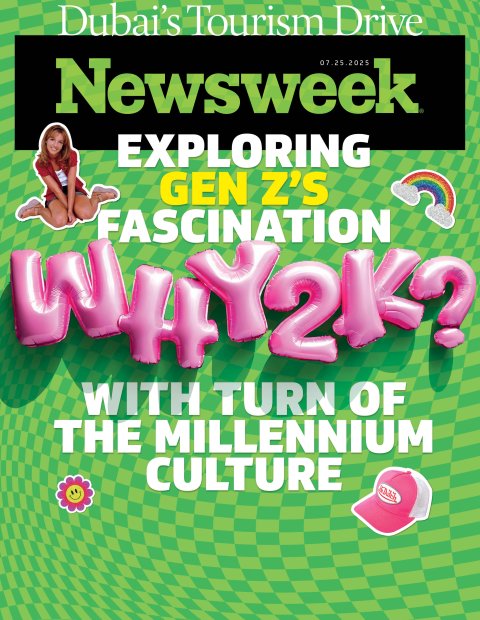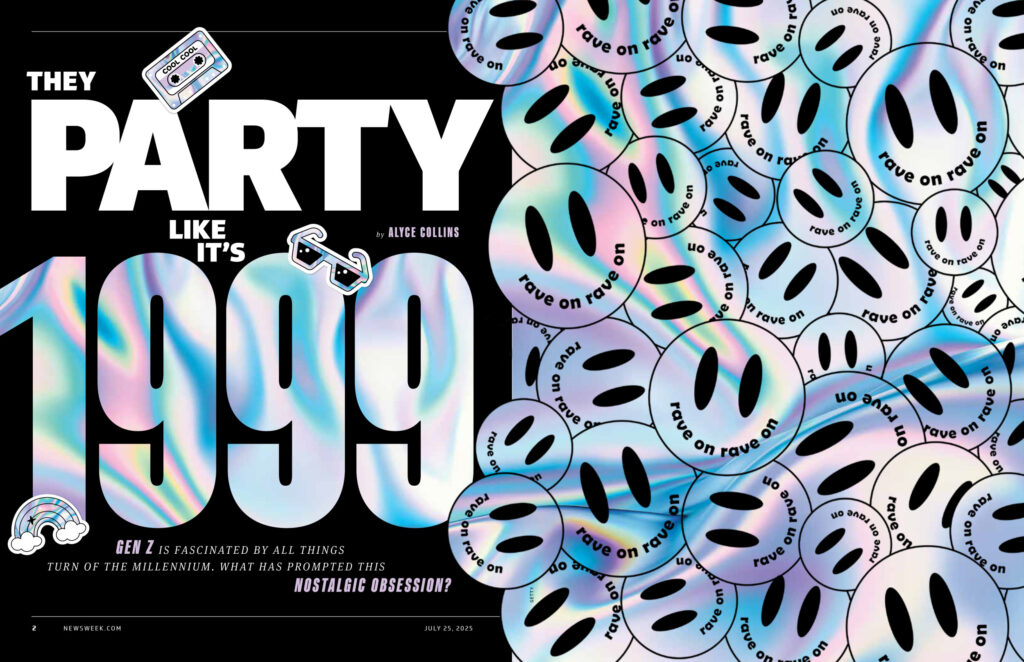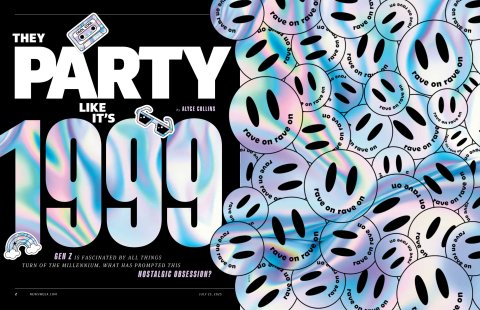
It’s sometimes hard to believe that the turn of the millennium was a quarter of a century ago. In many ways, life felt vastly different back then—the internet was still in its relative infancy, phones were used to make calls, and X was just a letter in the alphabet.
It was an age before smartphones and social media, the war on terror hadn’t begun, and global economies were yet to be impacted by the financial crash.
Those days feel worlds away and yet Y2K has made a resounding comeback among younger generations. Whether it’s fashion, movies, TV or music, many people from Generation Z (those born between 1997 and 2012) are returning to that era and making it au courant once again.
New installments of films like Happy Gilmore, Jurassic Park and Freaky Friday return this summer, as TV favorites like Friends and The O.C. attract younger viewers on streaming services.
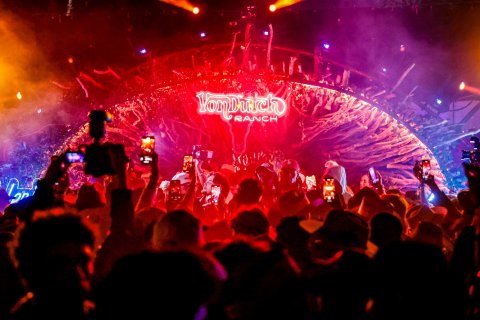
Tiffany Rose/Getty for Von Dutch & Tequila Don Julio
Music from the era is seeping back into the mainstream as well, with Nirvana’s You Know You’re Right featuring in The Last of Us, British band Oasis playing reunion gigs to sold-out stadiums and American rock band Creed, whose hit « Higher » has become a favorite again at sporting events, headlining a Summer of ’99 and Beyond Cruise concert series next spring.
Fashion brands synonymous with the early 2000s—Von Dutch and Ed Hardy—have become staples again, butterfly hair clips and tiny sunglasses are must-haves, and colorful eyeshadow is back in. Even Tamagotchis—the pocket-sized digital pets of Y2K childhoods—are back, turning Gen Z backpacks and belt loops into nostalgic nods to the turn of the century. Riding the same wave, Britney Spears has found renewed popularity with Gen Z in recent years, culminating in May this year when The Singles Collection reached 200 weeks on the U.K. Albums Chart.
Gen X may be a relatively small demographic, compared with the sizable populations of boomers and millennials, but the impact of this generation’s heyday has captured the imaginations of Gen Z. Raven Baker, a social and community lead at Adolescent Content, who researches Gen Z habits, told Newsweek that for this generation that constantly lives in a digital world, there’s something novel yet attainable about Y2K.
« I think it’s partly escapism as they can distract themselves from current woes, whether that’s school, work, friendships or parents. It allows them to indulge in something that’s so different from today, » Baker said.
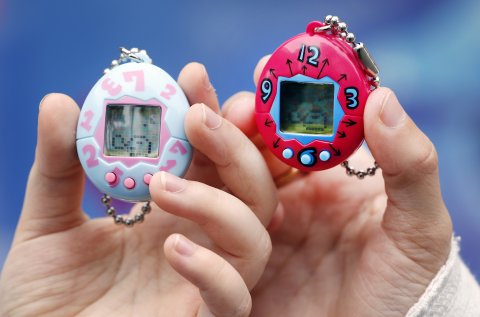
More
Chesnot/Getty
Was Life Better Back Then?
A report by the American Psychological Association found that young adults are overwhelmed by stress, with many claiming a much higher stress level than older generations. So is it any wonder they want to hark back to what seems like an easier time?
It helps that many relics of that era are readily available, whether it’s entire TV series on streaming platforms, or celebrity photos from back in the day going viral on TikTok. Lily Todos (@lilytodos) shares 2000s-inspired outfits and recreates iconic movie looks on the platform. Todos, 25, from the U.K., told Newsweek that throwback fashion has become a « form of escapism » for her because the world seemed like a « better place back then »— fashion styles were more varied, the quality was better and people were « living for real life, » which created authenticity, Todos said.
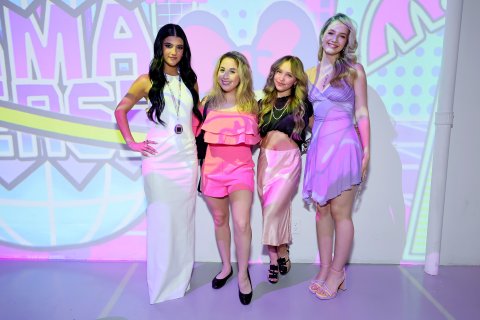
Theo Wargo/Getty
Gen Z has grown up in an age of social media where every step they make is captured and shared for an audience. In Baker’s view, they yearn for a time when people could make mistakes and experiment without the fear of going viral or, even worse, being canceled.
« I think there’s a desire to be uninhibited, to not feel judged, and to not have it recorded forever on someone’s digital footprint, » Baker said.
« We’re living in a surveillance era where even friends can monitor you and see what you’re doing. If someone catches you doing something bad, the instinct is to post it online. Whereas people enjoy the early aughts because there was such a lack of that. »
As younger generations view Y2K through a media lens, it’s easy to romanticize and perhaps sanitize those years. But it wasn’t all low-rise jeans, jelly sandals and meeting for coffee at Central Perk. Ben Lisle, an associate professor of American studies at Colby College in Maine, is keen not to erase the difficulties of that time. He told Newsweek that viewing the early aughts as a golden age would mean « historical erasure » of what was happening.
Before 2000, there was anticipation about what the turn of the millennium would bring, and while it gave way to technological advancements—the iPod in 2001 and Facebook in 2004—it was also a dark time for many. Lives were forever changed by the war on terror in the aftermath of 9/11, the devastation of the Indian Ocean tsunami in December 2004 and Hurricane Katrina in 2005, before the global financial crisis from December 2007 led to the Great Recession.
Lisle told Newsweek he is often « surprised at how little » his students know about such major historical events.

Courtesy Marina Riekkinen
For Lisle, this is an example of philosopher Fredric Jameson’s concept of pastiche, referring to the imitation and mimicry that pays homage to bygone styles or language. Lisle argued that we’ve become somewhat detached from the past and our connection to it « has been transformed into hollowed-out stylization. »
What Does This Say About Today’s Society?
Like the generations who came before them, Gen Z are learning to navigate the world and trying to work out what future they want. But, unlike their predecessors, they’re doing it in a time of information overload with the burden of social media and artificial intelligence.
While health and financial issues are the top concerns for younger Americans, they are also grappling with personal safety, human rights, loneliness and climate change, with anxiety and depression some of the most prominent mental health issues, according to the National Institutes of Health.
It doesn’t get much better when looking ahead, either, as more than half of people think the American dream is no longer a possibility, according to an ABC/Ipsos poll.
So, should we be surprised that young people spend so much time looking toward the past?
Much of the research that Baker has done for Adolescent Content has shown that Gen Z has « heightened anxiety, » causing a significant lack of confidence. Not being assured of who they are is what makes them retreat in time, Baker suggested.
She told Newsweek: « This generation has always been online. They were iPad babies and then they had smartphones from a young age. Constantly being online causes a lack of self-confidence because they’re always comparing to what someone else has. How can you ever ground yourself in true individuality if you’re constantly questioning who you are? »
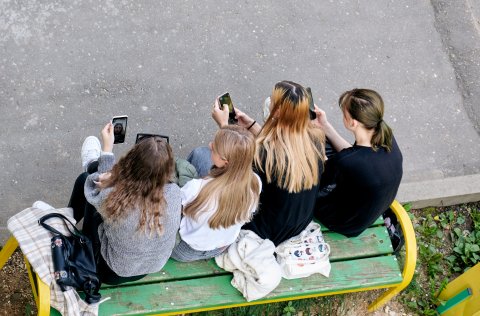
iStock Editorial/Getty
Despite the negative impacts, 36 percent of U.S. teens say they spend too much time on social media, and 54 percent say it would be hard to give up, the Pew Research Center reports.
Not only has Gen Z grown up online, but they also came of age during a time of cancel culture. For Baker, this marks an important shift which instilled a fear among young people about being called out.
« During the pandemic, when everyone was stuck inside watching people get called out, fired and tomatoed in the digital town square, it sent a clear message to Gen Z: Don’t share your honest opinion and don’t be transparent with strangers, » Baker said.
What’s With the Fascination?
Todos certainly isn’t the only person who has cultivated a social media following by recreating styles from the 2000s. Indeed, the hashtag #y2k has more than 4.1 million posts on TikTok alone.
What Todos loves so much about clothes from that time is the detailing (think glitter, beading and diamanté). She told Newsweek that she thinks people are looking for « more detail with their clothes » now, following years of minimalism.
The resurgence of Y2K styles may not be all too surprising, however, as fashion historian and author Robert Ossant explains that trends often occur in 20-year cycles. What makes this trend so attainable is conceivably the recency bias, but also the parallels between then and now.
Ossant told Newsweek: « The early 2000s was a period of optimism and anxiety around emerging technologies. Now, with AI, people are feeling the same—will technology boost careers or create a future where young people are surplus to requirement? The styles and anxieties are aligned.
« All reemerging trends play on nostalgia, so younger generations look back on Y2K and idealize it. They might prefer that era to their own and try to inhabit it through their style, » he continued.
Ossant believes Y2K fashion originated with designer Marc Jacobs in 1992 at Perry Ellis. He championed youth style and was inspired by grunge. Before long, street fashion started to influence catwalks, as Ossant said he took youth culture « from fringe to mainstream. »
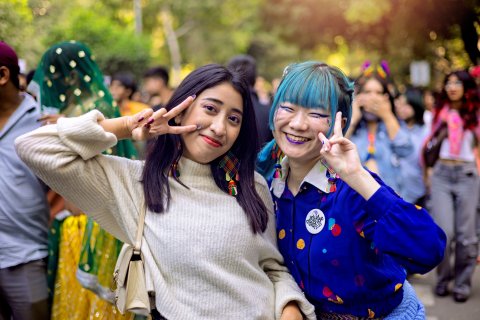
More
Uma Shankar sharma/Getty
It was no longer about what the wealthy were wearing. As the dynamic continued to evolve into the early aughts, fashion was all about what young people were gravitating toward.
« The style was go big or go home—bold colors, big plastic watches, ballooning parachute pants with tube tops. They took up space and expressed supreme confidence, » Ossant said.
Now, brands like Von Dutch and Juicy Couture have reestablished themselves as fashion staples. Miss Sixty, known for capri pants and double denim, named supermodel Bella Hadid as the face of its spring/summer 2025 line, a big coup for a brand that seemed to have gone out of style. Ossant suggested Gen Z are using nostalgic fashion to send a message.
« It’s Gen Z demanding to be seen, and because they continue to feel ignored, they are embracing the loud Y2K styles, » Ossant said.
How Is Media Feeding This?
Movies and TV shows are also providing Gen Z with iconic Y2K references that are still relevant today. Streaming platforms have introduced new audiences to old shows.
Marina Riekkinen, 21, has been heavily influenced by TV shows Gossip Girl and Sex and The City from the 2000s, telling Newsweek that she loves how characters « had their own unique style » back then. Those shows may have ended, but Riekkinen often recreates outfits that will live long in the memory. Her TikTok page (@marinariekkinen) is filled with ensembles that Serena van der Woodsen would be proud of. « The Y2K era highlighted individuality, boldness and self-expression through fashion, and that’s what resonates with me the most. It wasn’t about fitting in—it was about standing out, » the Finnish influencer said.
Part of the shows’ appeal is that young people can watch them and « shrug off the heaviness of today’s world, » according to entertainment journalist, pop culture expert and film critic Tatyana Arrington.
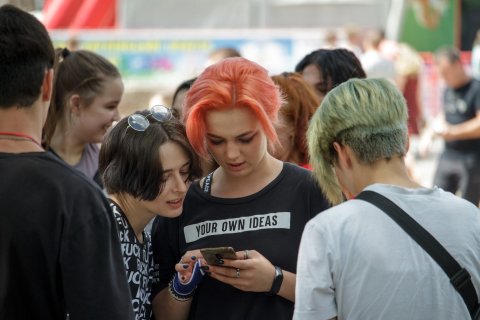
iStock Editorial/Getty
Much of the early 2000s holds a mirror up to Gen Z’s reality, making it feel attainable and authentic.
Arrington, from the U.S., said: « As they think that the world is so dark and there’s so much hate, they want to find pockets of joy. They look at these TV shows and interpret that as the promised future that was supposed to be theirs, but it’s not. »
She doesn’t believe it’s coincidence that Y2K is back in vogue. No, she thinks it’s a direct response to « the seriousness of today. »
There’s a desire among audiences to embrace the early 2000s, and that doesn’t just come from older content but new productions too. At present, Netflix’s most streamed English-language show is Wednesday, a show about the fictional gothic character Wednesday Addams who featured in the 1991 movie The Addams Family.
In 2024, it was announced that the much-loved 2000 sitcom Malcolm in the Middle would be rebooted, and Freakier Friday, a sequel to 2003’s Freaky Friday, is due to be released this summer. Anne Hathaway is also reprising one of her most iconic roles, Princess Mia, in The Princess Diaries 3, more than 20 years after the first installment.
If that wasn’t enough, fans of the 2004 hit series Desperate Housewives rejoiced at the recent announcement of a spinoff titled Wisteria Lane.
Like many others, Arrington loves rewatching the classics and remembering « the good old days. » They’re comfort shows for a reason, and while Gen Z might not have been around back then, they can romanticize what it was like through these formats.
« The Y2K era was fun, and it allows them to step into a world where they feel welcomed and accepted, » Arrington told Newsweek. « That was a joyous time, and they’re just trying to bring some of that into the world we live in today. »
